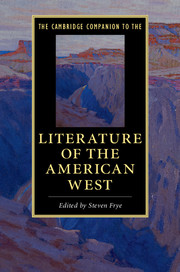Book contents
- The Cambridge Companion to the Literature of the American West
- The Cambridge Companion to the Literature of the American West
- The Cambridge Companion to the Literature of the American West
- Copyright page
- Contents
- Figures
- Contributors
- Chronology
- Book part
- 1 Introduction
- 2 Transnational Wests: the literature of Spanish exploration
- 3 Western folk traditions: from colonization to Mark Twain and the San Francisco Circle
- 4 Settlement, promise, and catastrophe in the middle regions
- 5 Gender and the literature of expansion
- 6 The American West and the literature of environmental consciousness
- 7 California in late settlement
- 8 The West in modern verse
- 9 Noir fiction and the Western city
- 10 The Western and film
- 11 The Native American Renaissance
- 12 Chicana/o literature in the West
- 13 Mestiza consciousness of La Frontera/Borderlands in Sandra Cisneros and Helena María Viramontes
- 14 The West and the Asian American experience
- 15 African American literature and the early West
- 16 Wallace Stegner and the literature of historical memory
- 17 Cormac McCarthy: narratives and borders
- Further reading
- Index
- Series List
- References
13 - Mestiza consciousness of La Frontera/Borderlands in Sandra Cisneros and Helena María Viramontes
Published online by Cambridge University Press: 05 May 2016
- The Cambridge Companion to the Literature of the American West
- The Cambridge Companion to the Literature of the American West
- The Cambridge Companion to the Literature of the American West
- Copyright page
- Contents
- Figures
- Contributors
- Chronology
- Book part
- 1 Introduction
- 2 Transnational Wests: the literature of Spanish exploration
- 3 Western folk traditions: from colonization to Mark Twain and the San Francisco Circle
- 4 Settlement, promise, and catastrophe in the middle regions
- 5 Gender and the literature of expansion
- 6 The American West and the literature of environmental consciousness
- 7 California in late settlement
- 8 The West in modern verse
- 9 Noir fiction and the Western city
- 10 The Western and film
- 11 The Native American Renaissance
- 12 Chicana/o literature in the West
- 13 Mestiza consciousness of La Frontera/Borderlands in Sandra Cisneros and Helena María Viramontes
- 14 The West and the Asian American experience
- 15 African American literature and the early West
- 16 Wallace Stegner and the literature of historical memory
- 17 Cormac McCarthy: narratives and borders
- Further reading
- Index
- Series List
- References
- Type
- Chapter
- Information
- The Cambridge Companion to the Literature of the American West , pp. 170 - 183Publisher: Cambridge University PressPrint publication year: 2016



